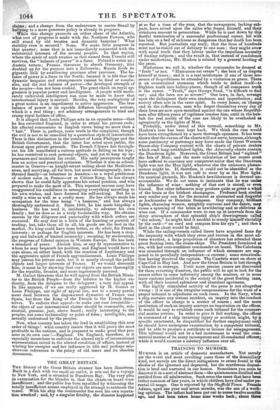THE GREAT BRITAIN.
Tun history of the Great Britain steamer has been disastrous. Built in a dock with too small an outlet, it sets out for a voyage to New York, and is stranded in Dundrum Bay. The very plea in extenuation for the blunder is, that the charts on board were insufficient; and the public has been mystified by witnessing the totally insufficient means employed in the attempt to extricate the vessel. With his ship the commander has seen his own reputa- tion wrecked ; and, by a singular fatality, the disaster happened at so flat a time of the year, that the newspapers, lacking sub- jects, have seized upon the sailor who forgot himself, and their strictures amount to persecution. While he is cast down by this fearful termination of a successful professional career, his wife has lain on a bed of sickness so dangerous that her death has been reported. But journalists say truly, that the lives of hundreds must not be risked out of delicacy to one man : they might avow with equal truth that they labour under the imperious necessity of finding subjects • and the result is, that instead of condolence under misfortune, Mr. Hosken is saluted by a general hooting of the press. Misfortune we call it, whether the commander be deemed at " fault " or not. "Humanum est errare "; the best of us forget, himself at times ; and it is a real misfortune if one of those mo- ments of forgetfulness be attended by a visitation so grave. There is an overstrained sternness which tends to defeat itself—to frighten truth into hiding-places, though of all compasses truth is the surest. " Truth," says George Sand, "is difficult to find out ; and the laws are so severe!" Our laws, in fact, revenge upon the delinquent their own crudeness and imperfection ; and society often acts in the same spirit. In every house, on 'change and in the coffeeroom, men who forget themselves every day of their lives are now open-mouthed against the one whose forgetful- ness after fifteen years of vigilance crushes him, until in the hub- bub the real merits of the case are likely to be overlooked as egregiously as the lights of Man.
Probably, under dread of this turmoil, something in Mr. Hosken's case has been kept back. We think the case would have been strengthened by a more thorough openness. It has been shown that the excuse of the charts will not serve, because, although some parsimony or patronage may have made the Great Western Steam-ship Company content with the charts of private dealers which omit long-established lights, the Admiralty charts contain the Dundrum light. Moreover, the Great Britain had " sighted" the Isle of Man; and the mere calculation of her course must have sufficed to convince any competent sailor that the Dundrum light was not the Man light, whatever else the unknown phseno- menon might be. If, therefore, it could not be identified as the Dundrum light, it was not safe to steer by as the Man light. On nautical grounds, Mr. Hosken's bewilderment is deemed tuts accountable. We do not mean to insinuate that he was undar the influence of wine : nothing of that sort is stated, or even hinted. But other influences may produce quite as great a whirl of the brain as the briskest champagne. Profound book studies may render any one for the moment as abstracted and forgetful as Archimedes or •Dominie Sampson. Gay company, brilliant lights, charming women, sprightly converse and the dance, may cause a spinning of the brain as bewildering and as oblivious as wine can. If a commander were to run up at intervals from the dizzy atmosphere of that splendid ship's drawingroom called L°the saloon," he might find it needful to steady himself slavishly by the card—" on card and compass firm his eye " ; and then a fault in the chart would be fatal.
While the sailing-vessels called liners have acquired fame for the impunity with which they cross and recross in the most ad- verse weather, a large proportion of disasters has attended these great floating inns, the steam-ships. The President foundered at sea, with her over-confident commander on board. The Caledonia was stranded through an influence of which steamers are sup- posed to be peculiarly independent—a current; some miscalcula- tion having deceived the captain. The Cambria went on shore at Cape Cod in May last. And now the Great Britain is lost through a blunder in steerage. Until more precise causes are discovered for these recurring disasters, the public will be apt to look for the causes either in some inferiority among the masters, or in some laser customs incidental to the society of the great floating inns, with all their boasted splendour and abundant agremens." The highly stimulated activity of the press is not altogether wrong : it is one of the irregular compensations for the want of a proper tribunal to adjudicate on such cases. In the Navy, when a ship sustains any serious accident, an inquiry into the conduct of the officer in charge is a matter of course ; and the mere institution of such an inquiry conveys no imputation on the officer. It would be easy to establish some such tribunal for the commas. cial marine service. In order to give it full working, the officer in command of a ship incurring injury or accident might, by a specific enactment, be disqualified for further employment until he should have undergone examination by a competent tribunal, and be able to produce a certificate or licence for reengagement. This tribunal would not be a bad instrument to weed the com- mercial marine of its many incompetent and ill-conducted officers; while it would exercise a salutary influence over all.


























 Previous page
Previous page